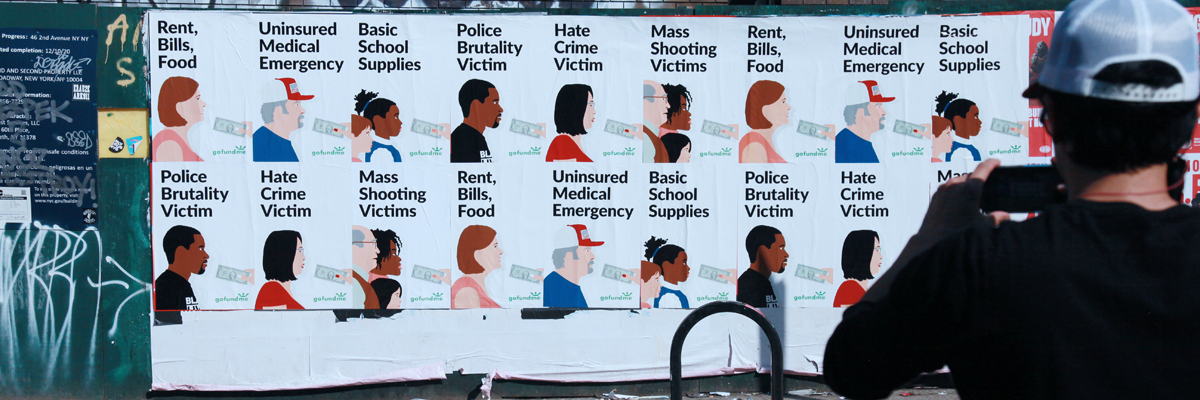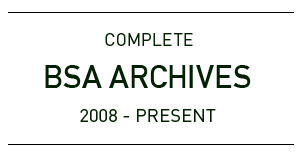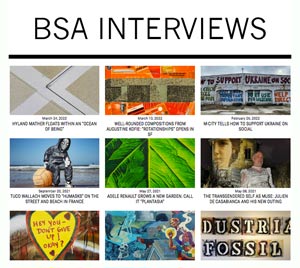On a recent sunny May day, we followed street artist Winston Tseng to document his new series of posters installed on three locations in Manhattan. The series is titled “Money Fixes Everything.”
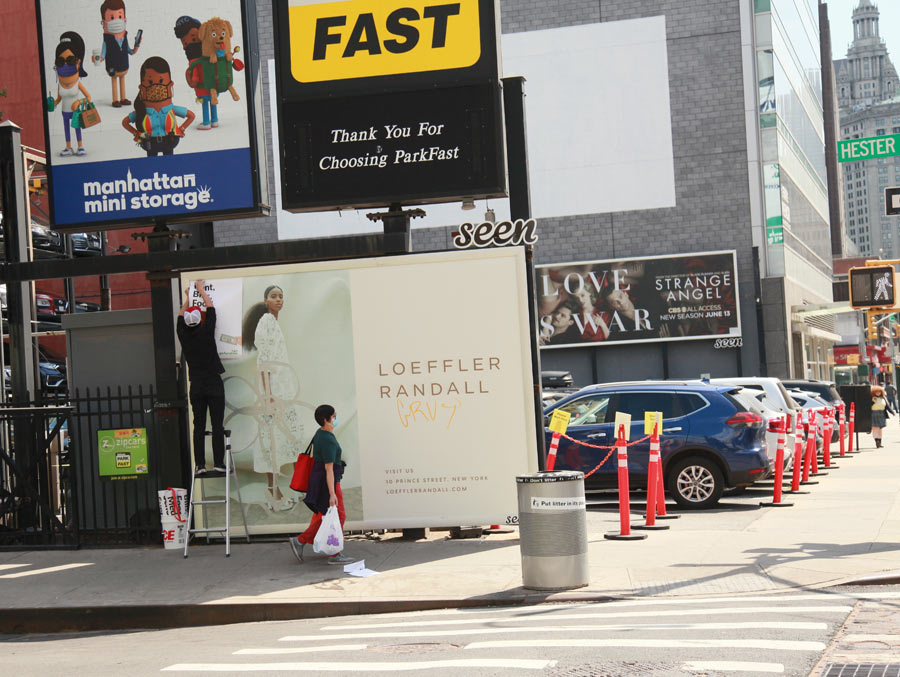
The flat and colorful 2-D illustration style of street artist/graphic artist Winston Tseng doesn’t scream social inequity and cultural insanity the way other graphic styles may. The graphic language is the 2-D, flat, icon-based vernacular familiar to phones and applications, a neutral and familiar reduction to precisely convey the visual elements necessary to infer more is there. Brilliantly pared and exacting in composition, a close look allows the viewer to unpack Tseng’s specific brand of critique – perhaps causing you to crack a smile, or roll your eyes, shake your head.
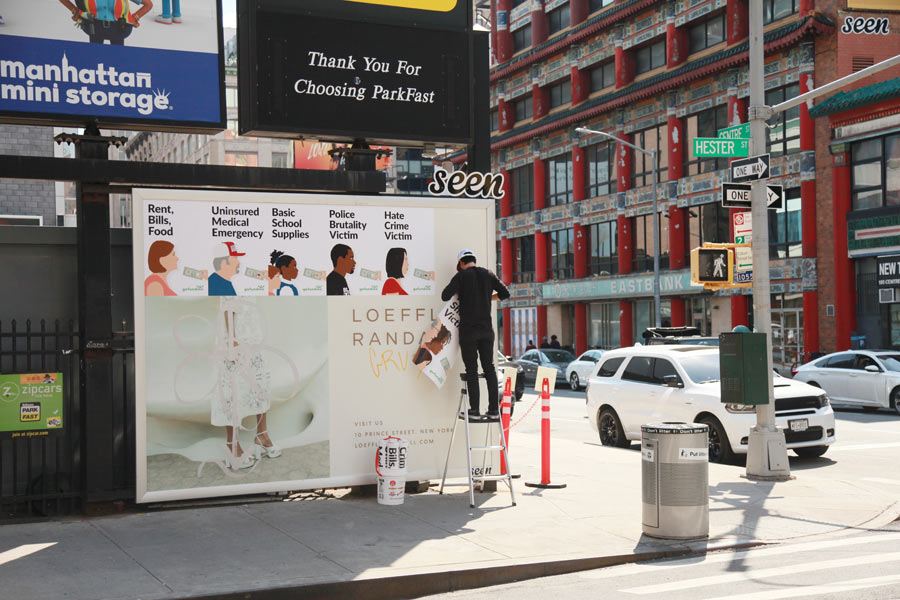
New York street artists have tackled social, political, religious, class, and structural systems of inequity in waves during street art’s newer rise to consciousness. Rather than using messages as a blunt instrument for screeds, you now see the subtle nature of messaging in Tseng’s work. Skilled in the unspoken and the finespun art of steering consumer pathways toward the adoption of products or services, Tseng uses these images on the street to evoke other concepts.
Tseng delivers in the common street form of wildposting, employing the familiar poster form as a vehicle on the street, piqued passersby’s interest with his razor-sharp perspective that digs into more complex themes. His own sense of activism is not necessarily vicious, but when he plucks the proper internal chord, he can produce a virulently strong reaction. He tells us that he savors every inflection.
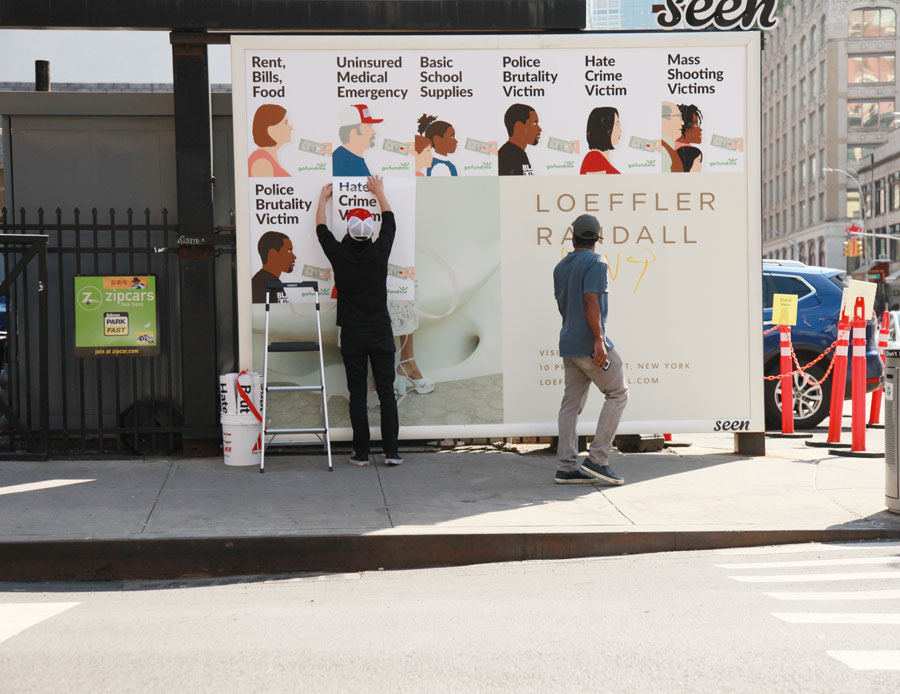
Here, his new campaign parallels nicely with the unprecedented pumping of trillions of fictional dollars into the economy to prevent (some would say ‘exacerbate’) a potential domino-style collapse at this moment in history. He maintains that we need to examine this default response to many problems by simply throwing money at them. Tseng may be hinting that he doesn’t think this solution will work.
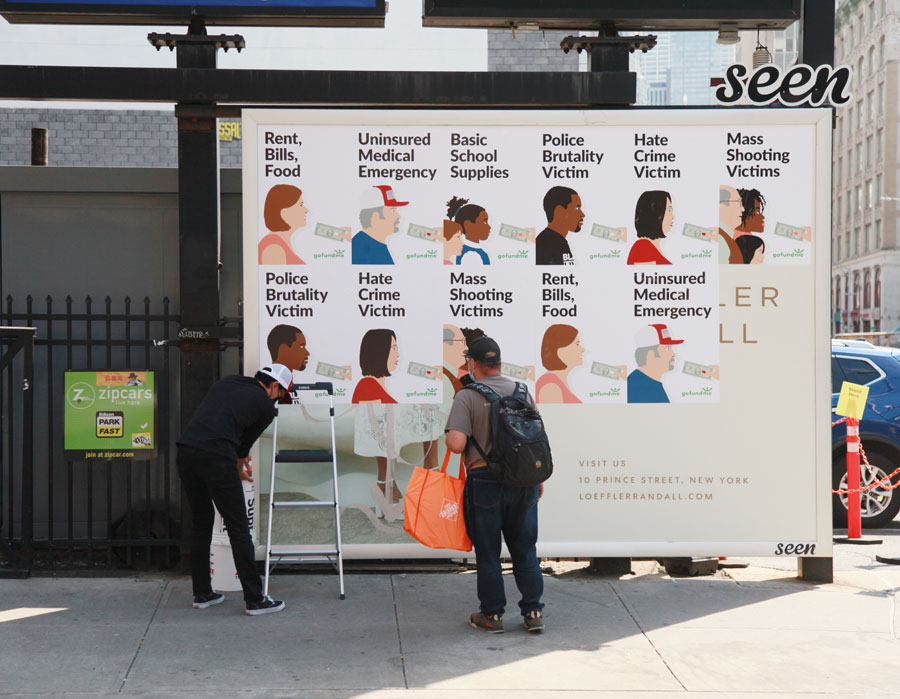
Winston Tseng spoke with Brooklyn Street Art about his approach, the context he is creating within, and what market he is smartly selling his ideas to.
Brooklyn Street Art: Do you have a name for this campaign?
Winston Tseng: The name for the series is “Money Fixes Everything.” That’s obviously a sarcastic comment.
BSA: Well, sometimes sarcasm helps.
WT: True, that’s true.
BSA: Can you talk about where you draw inspiration from? Current events? You obviously follow the news and media landscape…
WT: Absolutely. I think I consume the news and the Internet the way many people do these days. I feel like it’s hard to turn away and hard to tune it out.
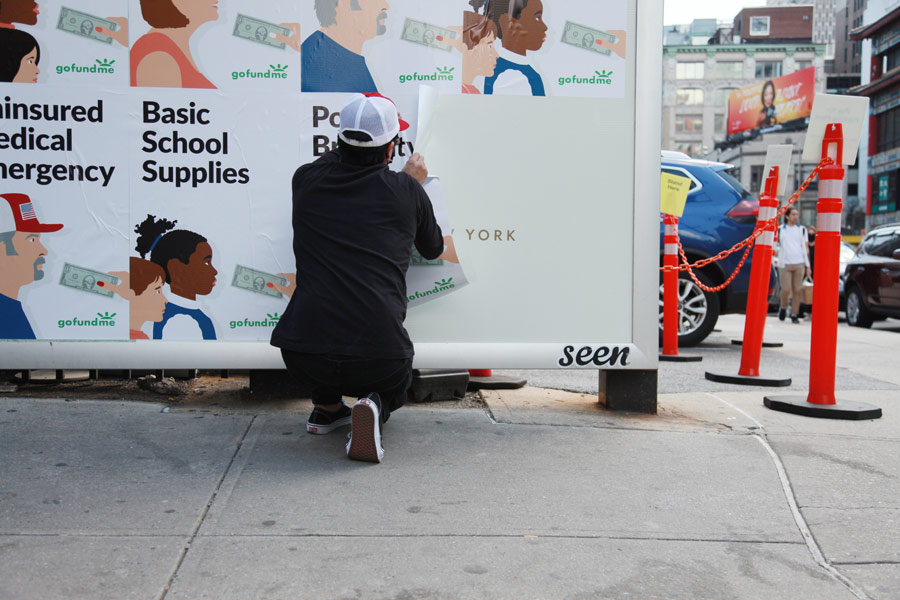
BSA: As you are watching current events and something catches your eye or ear, do you immediately make a concept of how that will look? What is the process?
WT: I would say that I wish that it came to me quickly. Sometimes it does, but a lot of times it doesn’t. A lot of times, I feel like it comes in two parts. There is one part about essentially the topic that I want to capture, and ultimately I want the work to reflect the times that we are in. The other part is “how do I say it in a certain way, through my style, which is corporate advertising as a medium”- How do I say it in a way that gets the idea across in a manner that I like to express it in, which is toeing the line between being really blatant and be more subtle?
BSA: It looks like you try to strike a balance with humor in your work. I don’t know if that is intentional or it’s you, not knowing that you are funny.
WT: I think I try to use humor; I don’t think I’m doing it in the funniest way because it is a bit of dark humor. I think the medium I use is a good way of getting peoples’ attention, getting them to tune in to the work I’m putting out there. I think humor is something that people are pretty receptive to.
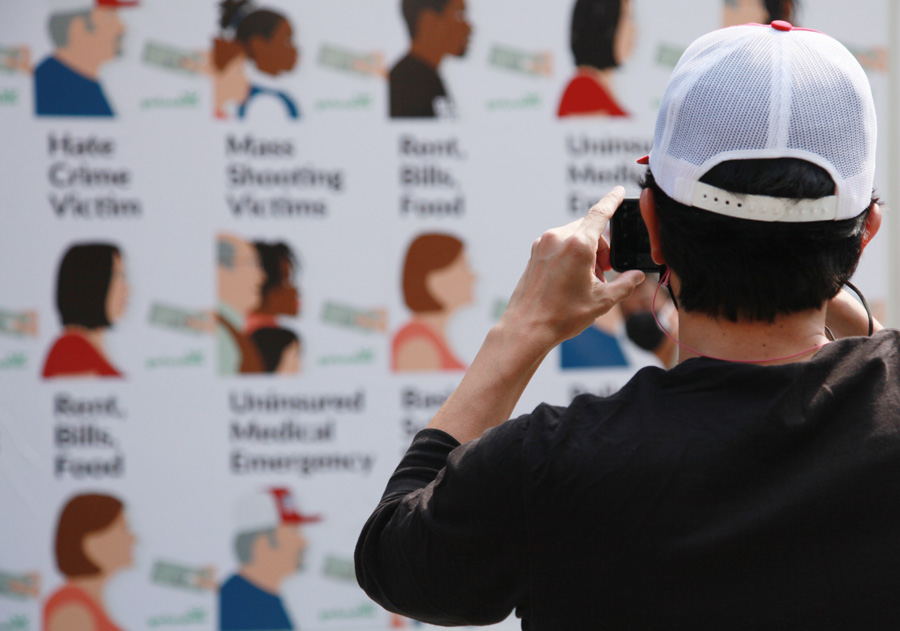
BSA: It is interesting that you use corporate advertising as a model. At the same time, one could see it as a kind of political cartoon, although different perhaps from a typical New Yorker cartoon, for example. It appears as if you are trying to get the point across while poking a finger at the media and corporations. It is like three stones are being thrown at the same time.
WT: I think you’re right. For me, corporate advertising is really just a medium that helps get the message across. One because we are inundated with it, and because of that familiarity, unfortunately, we aren’t paying attention to it. Still, it is a way I can reach peoples’ attention. That said, the media isn’t really the message or part of the point. The corporation is definitely not always a target. More so, it’s just a way to register in people’s brains what the message might be. For example, in this latest series where I use “GoFundMe,” but it’s not a shot against “GoFundMe” really at all. I think what they are doing enables a lot of people to get help. It’s kind of weird that it is a for-profit company. But other than that, it’s more just about using “GoFundMe” as a quick way for people to put it together.
BSA: At other times, you really do go after, for example, the health industry and the banks.
WT: True.
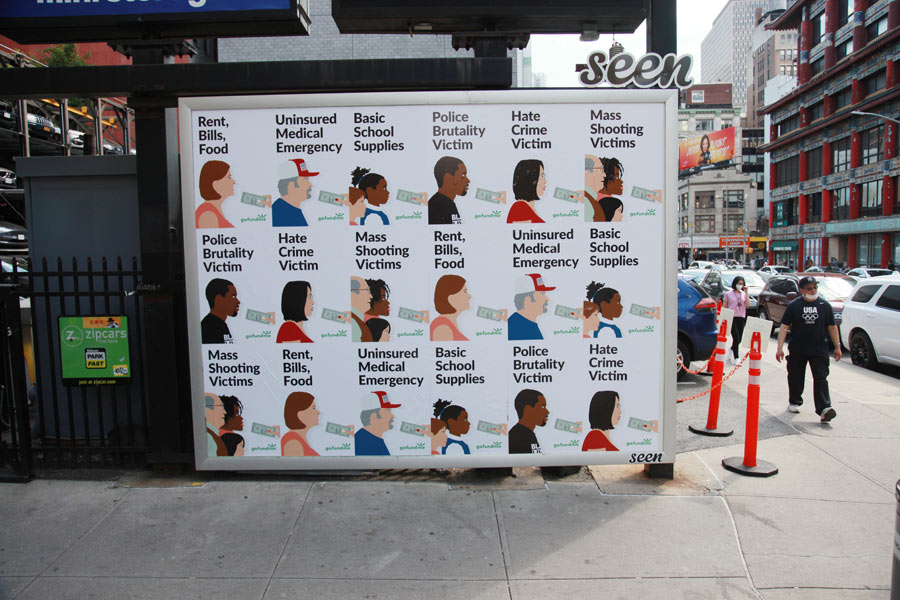
BSA: Corporations aren’t necessarily evil, but capitalism appears to have run amok. It looks like it has forgotten that it doesn’t have to be only for the few, but can be for everybody. For the new series, you were talking about people having enough food or money to buy it, people having enough money to buy insurance, people being able to be who they are on the street without being afraid of the reaction to the color of their skin or their country of origin or their ethnic background. There are so many topics right now that are just boiling, and it is rather overwhelming. Can you sleep at night?
WT: I think you hit it on the head, which is that this series allowed me to check a lot of boxes at once and to touch on a lot of subjects that have different causes and different route reasons why they exist in our society, and I guess the commentary that I am making and this one is that our solution right now is one of throwing money at it. It’s not really going to solve those problems systemically. This was a case, to your point, where I had a bunch of ideas of subjects that I wanted to address, and as it turned out, I could get them all done with one concept that checked off six subjects.
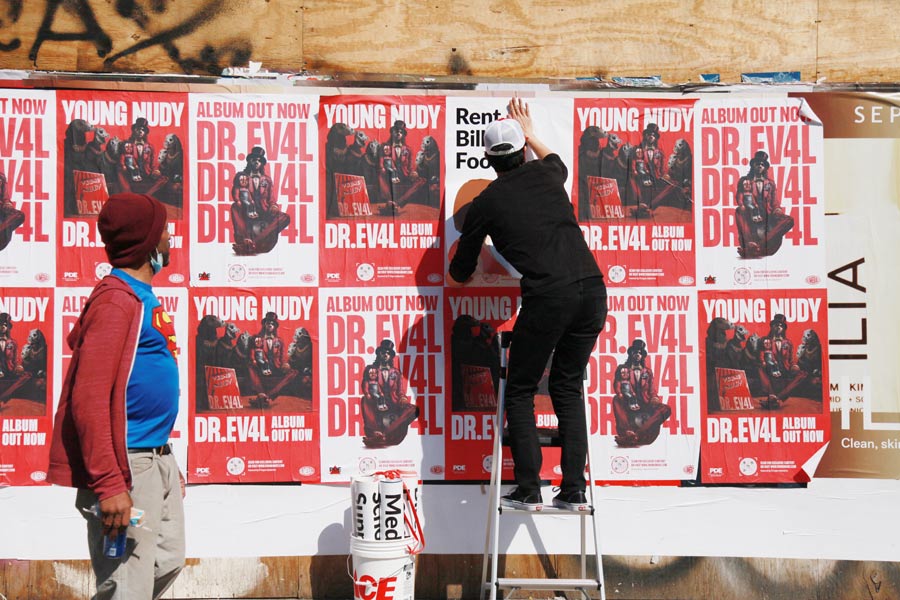
BSA: Also, you found a spot on a large wall where you could put 18 posters at once, mimicking what we see on the subway, where they plaster one entire subway car with the same ad campaign. In that way, you were taking a page from the advertising companies.
WT: Absolutely. I think it has been proven that repetition get messages
across and, in this case, I think that if I put these posters one at a time on their own, a person might not get the full picture of what I’m trying to convey. It was important for this series to have a lot of posters together. The use of repetition is important because these are things that we constantly see in our society again and again. We see mass shootings; we see hate crimes; we see police brutality; we see people who are having financial problems. So the idea of the repetition is there also to support how it is occurring in our society.
BSA: So in the last few years since we first followed you on this ongoing project doing an installation like this, you have received some “cease and desist letters”?
WT: Yes, I have gotten a few “cease and desist“ from the companies that run these advertising spaces. They haven’t come directly from corporations.
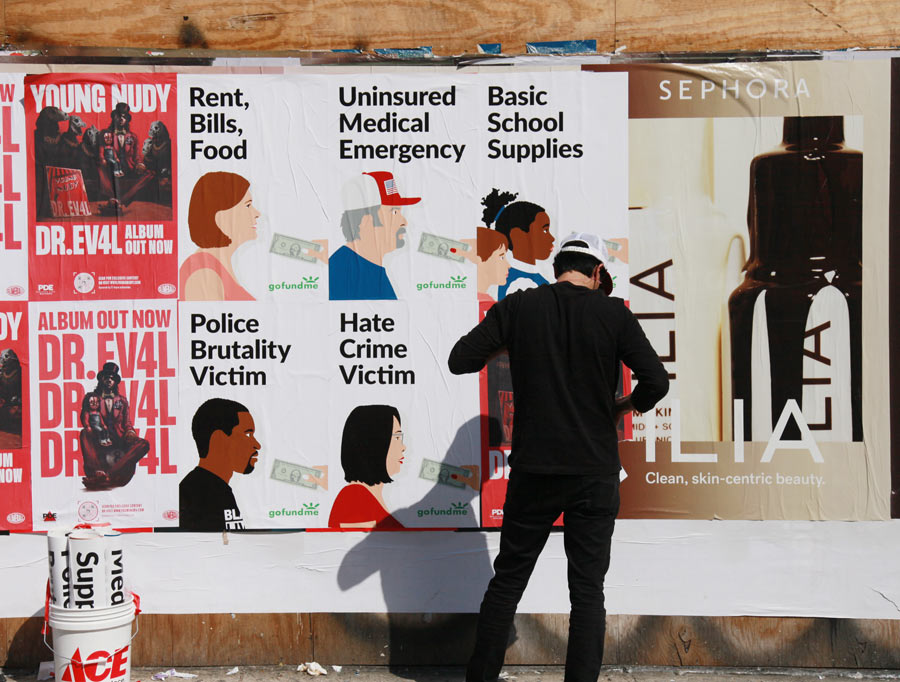
BSA: Also, you have received some attention in other media. You received a write-up recently in Juxtapoz magazine, I believe. And so are you satisfied? I know your work is never done until it’s done. Have you gotten a level of satisfaction so that you can continue to do it? Have you become a little despondent and like “this is not working” or “this is not working”? Is your goal to do it for yourself, do it for others? Is your goal to change the world one person at a time. What is your goal?
WT: First and foremost, it’s mainly for me. I get either personal satisfaction or stress relief out of it. It’s a creative outlet. I think it is always encouraging. I always appreciate any sort of coverage or people sharing or commenting on social media. Ultimately what I’m trying to do is capture the times we are in to reflect our society. It is hard to know if I am doing that correctly or achieving that goal – so all of these other things are giving small confirmations along the way.
BSA: So they have asked you to stop using their furniture on the street to put your art?
WT: I haven’t responded. I don’t know that it warranted a response. I know what they want, and I’m not responding.
I think I won’t really know until later on when we can all look back and say, “this was what it was like back then. This is something that was happening. This is crazy; this is fucked up.” So I am definitely as motivated as ever before to keep doing this. To what end? I think it’s just the general idea that, if I can just capture this time at this moment, maybe in the future there will be some benefit. Not personally, not for me, as a society.
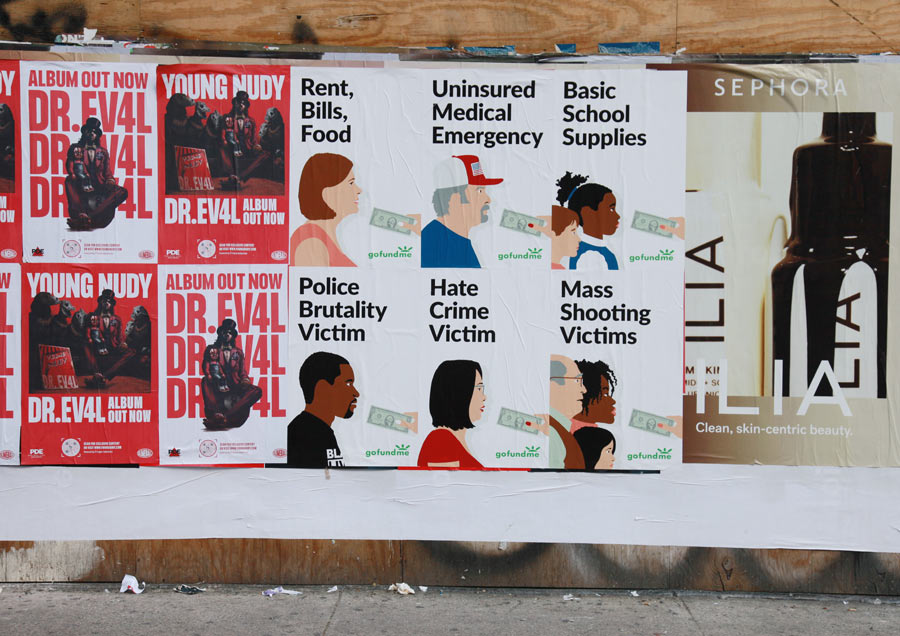
BSA: Do you get hate mail?
Winston: Yes.
BSA: Does it bother you?
WT: I think it varies depending on how serious it seems. I think it’s on a case-by-case basis.
BSA: Do you respond on social media?
WT: No, I don’t. I don’t really engage. I don’t feel like it is an effective end to that.
BSA: We were first with you when you were doing this series, and there was one poster that generated many controversies, and I was surprised that it was the one that had a sports reference in it.
WT: I don’t think that was the most controversial of those ones.
BSA: Which one was it?
WT: It was the woman holding the Bible.
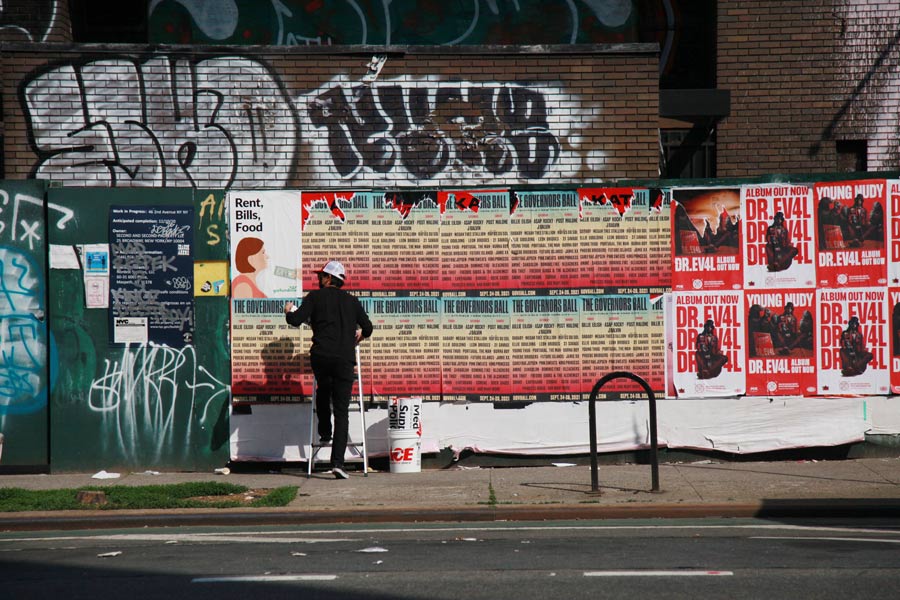
BSA: Let’s talk about it because it was a comment on Boston sports fans from our social media commenters, which seemed meant as a joke.
WT: That one, in my opinion, was what is the “lowest hanging fruit” and the least provocative. Again, I am trying to reflect the times or the sentiment or peoples’ attitudes. That’s not necessarily my personal opinion about sports, but it is a prevalent opinion that exists out there, especially in New York City, where there’s a rivalry with Boston sports. So that is not something that I created. I think the fact that it struck a nerve in either one of those cities among sports fans just kind of confirmed the concept behind it.
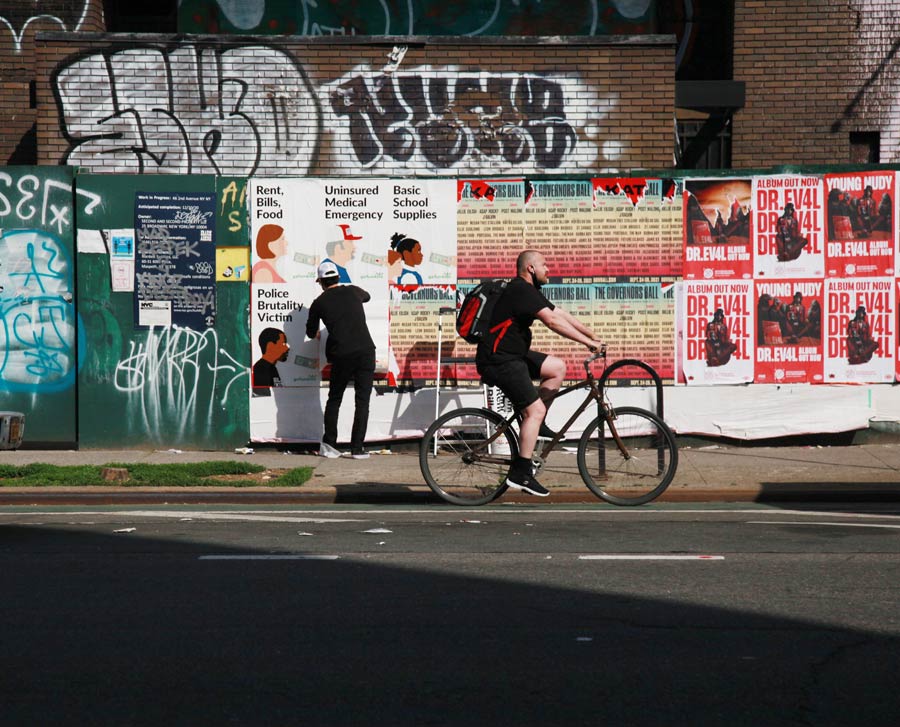
BSA: I thought it was funny the people who are into sports were so upset when they were other topics that were, in my opinion, more important – or at least ones that should be discussed more and in-depth. Those topics were kind of ignored because these fanboys were defending their teams. But it is interesting how passionate people get with those issues. Many people are interested in pulverizing you rather than debating issues. Many people who are there with personal attacks on social media are not there to debate the issue and to learn something about it, and come to a middle ground. They are there just to destroy you because they don’t want you talking about it.
WT: Yes, absolutely. I think that is the state of social media and the interactions between people who essentially don’t know each other in real life.
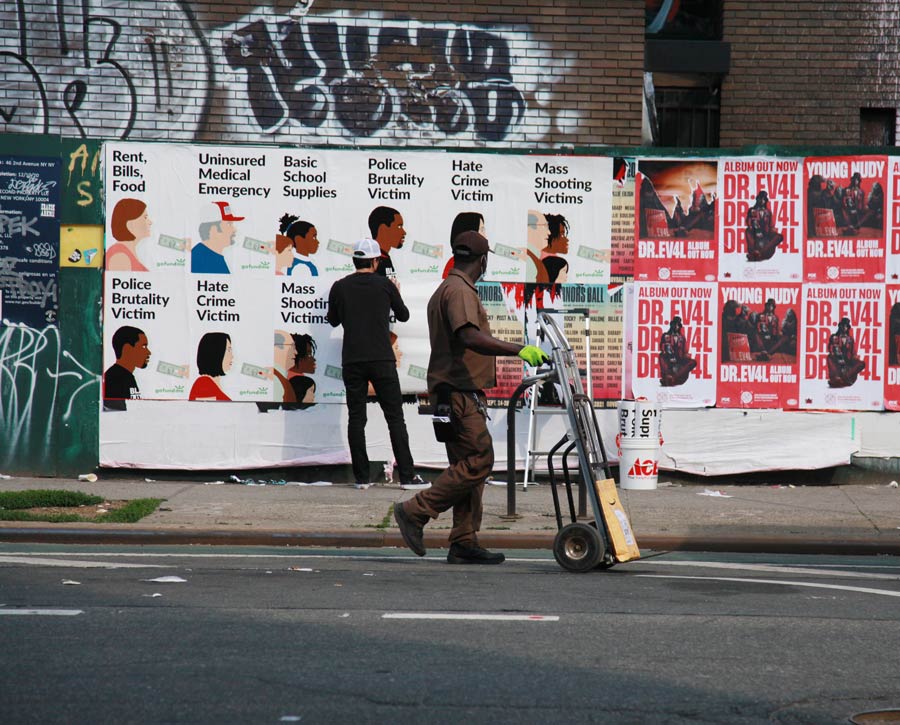
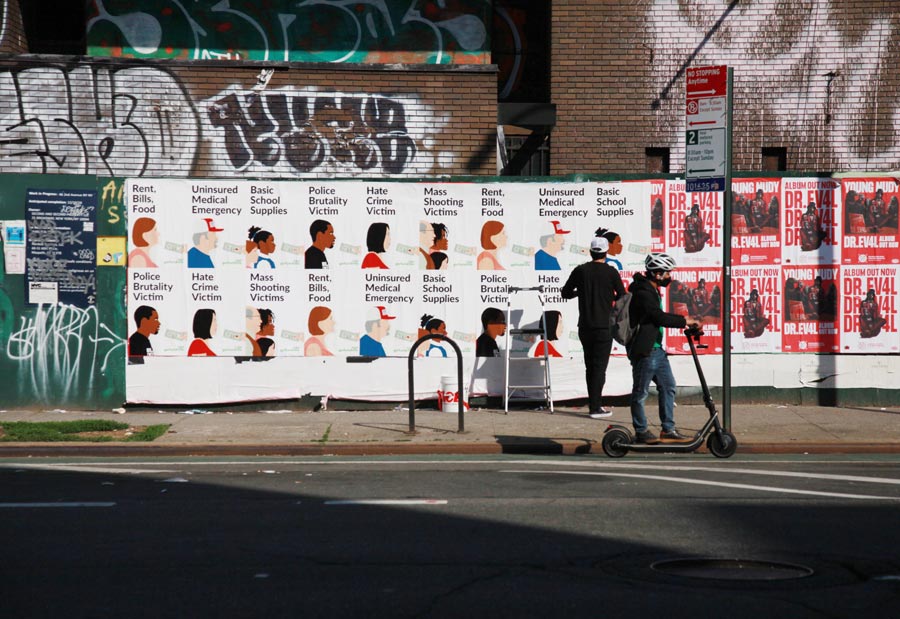
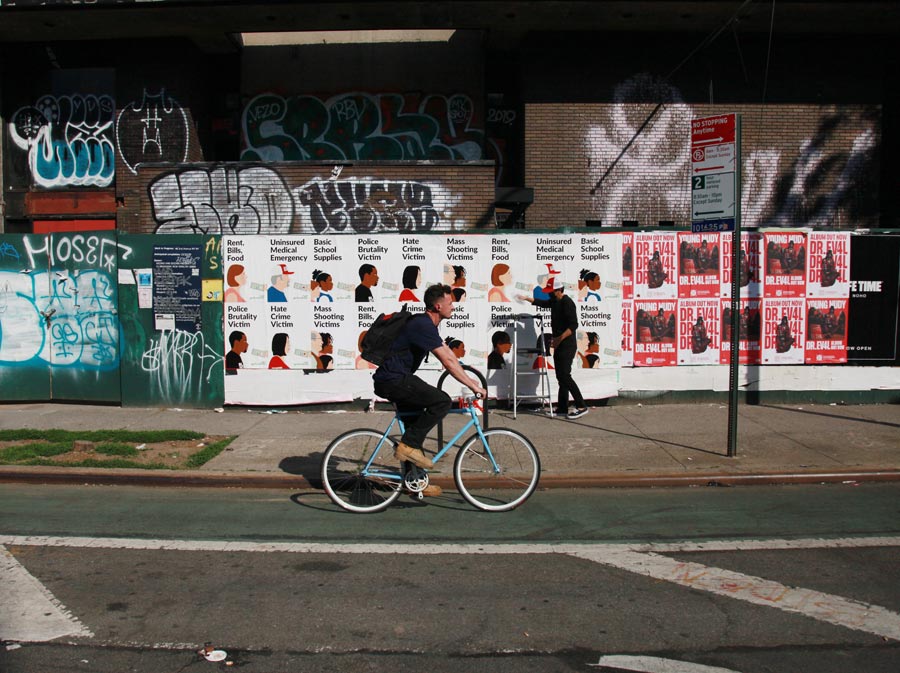
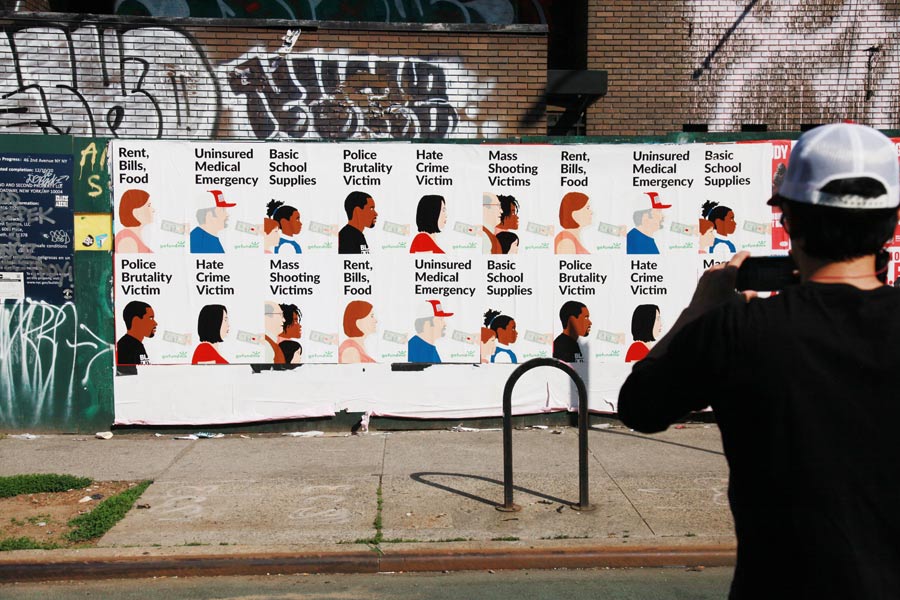
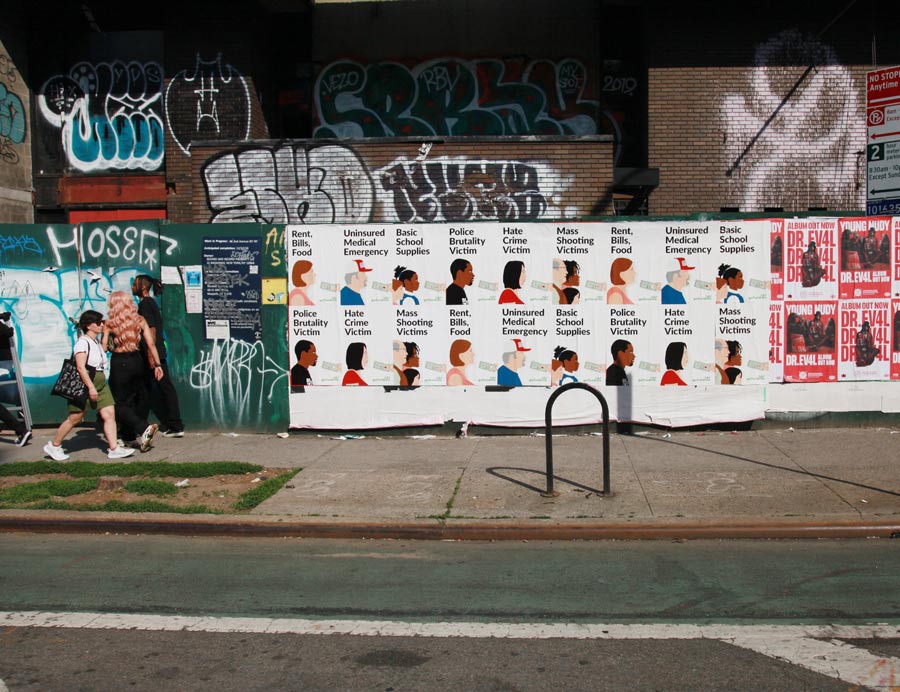
Other Articles You May Like from BSA:
Our weekly focus on the moving image and art in the streets. And other oddities. Now screening : 1. Madrid's Finest: Alber, Snack, and Ysen 2. 10 Spots to Experience Street Art and Graf...
BISUAL’s post-human sallow skinned characters are laboratory inventions that contain elements of animal, chemical, organic, electronic, psychedelic – minus the superpowers or sleekness of your typical...
“Olor a Azucenas el Perfume del Barrio” (The smell of Lilies is the Perfume of the Neighborhood) is the new mural by Don Rimx for this Brooklyn wall on Grand Street. Don Rimx. “Olor a Azucenas el...
Heading out to Nevada today to check out a mural on the plains that honors a cattle rancher and a freight-jumping graff legend cowboy as well. You may not think they have much in common but have you e...
“Catastrophe or salvation?” asks Various and Gould. “Being offline is scary and disastrous to most of us, however for some of us it might evoke the feeling of freedom through digital detox.” Vario...
 BROOKLYN STREET ART LOVES YOU MORE EVERY DAY
BROOKLYN STREET ART LOVES YOU MORE EVERY DAY